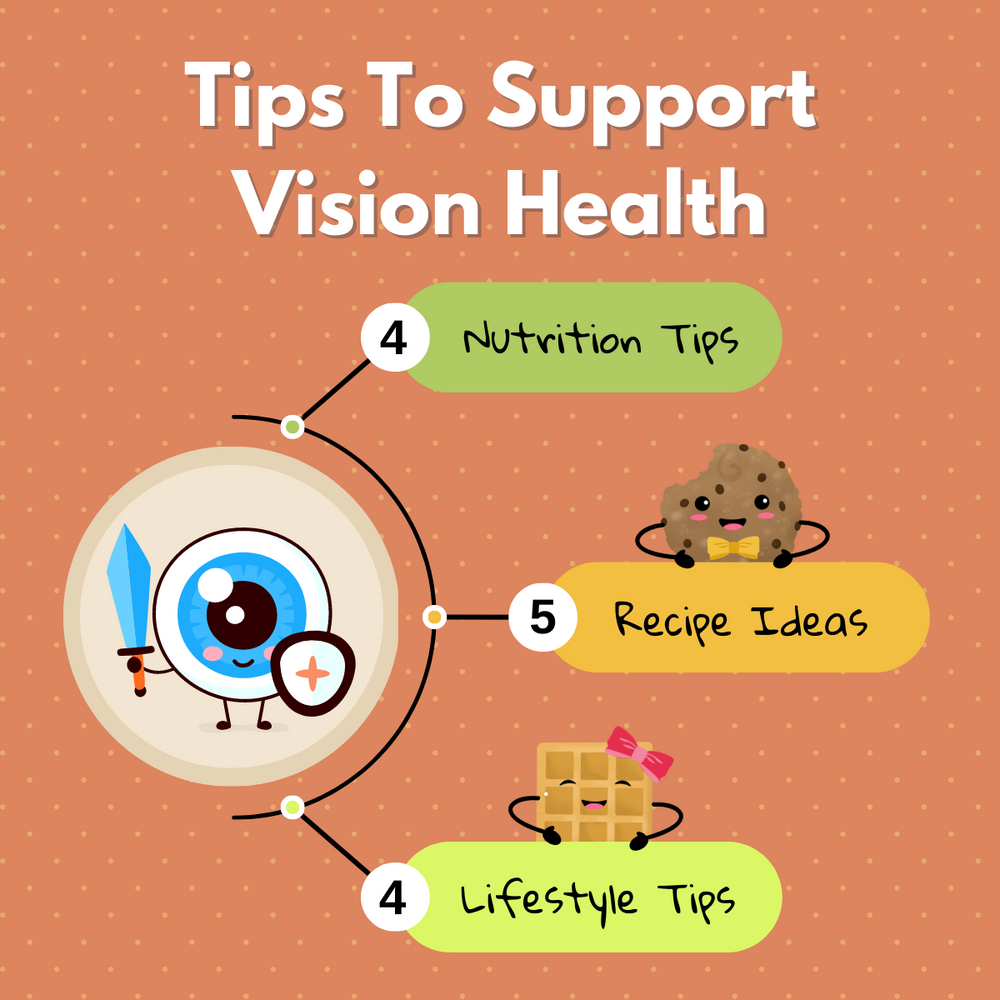Sarah's Tips to Support Your Family's Immunity

4 Dietitian-Approved Tips to Support Your Family’s Immunity
If you’re a parent like me, you’ve likely been exposed to a plethora of germs already, since the school year started. Cold and flu season has reared its ugly head, and parents everywhere are wondering what they can do to prevent more illness in their homes.
Unfortunately, there is no one silver bullet behavior or “super food” that will prevent illness or “boost” immunity on its own. As a registered dietitian—trust me—I wish there was! But the truth is, you can’t really “boost immunity”. And if you could, it would not be a good thing! Instead, you can support immunity through healthy lifestyle choices, including good nutrition. Below are four key areas outlined to help you set goals around optimizing your health and immunity.
-
Adequate Sleep: We all know our bodies need rest. Loads of research in this area supports the simple truth that sleep is key to general health, longevity and a strong immune system. Are you the “I can sleep when I’m dead” type? Be honest with yourself and ask, are you really prioritizing sleep? The Centre for Disease Control and Prevention recommends that adults get at least 7 hours of sleep or more for good health and wellbeing. Proper sleep hygiene is a good place to start. For example, plug your phone in away from your bed so you are less tempted to “scroll yourself to sleep”. Maybe your room is too light? Try blackout blinds or turn off electronics that emit light in your room before bed. These are simple ways to improve quality of sleep. Getting enough good quality sleep is also very important when it comes to properly interpreting hunger and fullness cues (aka intuitive eating). Our body and brain need rest in order to sense true hunger and satiety. If we can’t rely on our bodies to tell us when and how much to eat, it makes it much more difficult to fuel our bodies to maintain health and immunity.
-
Enjoyable movement: The Canadian 24-hour movement guidelines recommend that adults between the ages of 18-64 years aim for 150 minutes of aerobic activity per week with strength training activity twice per week. This amount of activity helps reduce risk for many diseases, improves longevity, and boosts quality of life. All activity counts! Meet yourself where you are at and strive to include enjoyable movement your day that you might even look forward to. Please do not force yourself to run on a treadmill or lift weights at the gym if it’s not fun for you. Activity that you dread doing will not be sustainable in the long run. If it sounds appealing, go for a walk outside in nature or simply park your car further away from work to get in a 10-minute walk. Take small steps to reduce the amount of time you spend sitting down. And be sure to make it something you enjoy!
-
Manage Stress: Easier said than done right? Especially for busy parents! Stress management is not a simple task and takes reflection and thought to tackle. Self-care is something that is easily put on the back burner, especially when life throws you curve-balls. Physical health is usually thought of first when it comes to health and immunity. Sleep, movement (as mentioned above) and eating well (mentioned below) are all ways to address your physical self-care. But let’s not forget about mental, emotional and spiritual health. Setting self-care goals in these areas is just as important when it comes to managing stress. Do you take time to self-reflect and journal? Are you able to say “no” to extra responsibilities when you are already slammed? Do you set aside “me time” or set healthy boundaries with people in your life? These are just a few questions to reflect on when it comes to prioritizing your self-care and stress management. If you can make small changes that reduce the amount of cortisol (a potent stress hormone) coursing through your veins, you will be one step closer in strengthening your health and immunity!
- Proper nourishment: Balanced eating and enjoying your food is key to fueling a strong immune system. Include variety in your diet, not only to provide essential nutrients, but also to inspire pleasure in your eating experience. At meal times aim to include protein (meat, fish, poultry, legumes, cheese, yogurt etc.), energy foods (whole grains and starches, as well as root vegetables like sweet potato etc.), fats (oil, nuts, seeds, avocado etc.) and colourful foods (fruits and veggies) to achieve a nutrient-dense and satisfying meal with staying power. Nutrients that come from actual food (vs. a supplement) work synergistically together to provide health benefits. See the table below for specific nutrients (and the foods that contain them) that help to support immunity.
Unfortunately, the pervasive diet culture of today floods us with countless restrictive messages and rigid food rules that can create guilt and fear around eating. Reconnecting to your internal body sensations and intuition when is comes to eating is a well-researched way to improve overall health. Eating with attunement to your body for satisfaction, can and should be the same thing as eating for health! Do you honor your hunger and fullness when it comes to eating? Or do you eat based on learned food rules? Your immune system and overall health and wellbeing will thank-you for reflecting on the way that you eat.
The below table outlines essential nutrients that support healthy immune function:
| Nutrient | Its Function | Foods it's found in |
| Protein | Provides amino acids that act as building blocks responsible for the structure, function and regulation of the body’s tissues and organs | Meat, poultry, fish, yogurt, cheese, nuts/seeds, chickpeas, beans, lentils |
| Fibre | Acts as a prebiotic feeding healthy bacteria in the gut which produce byproducts to support immune function and strengthen the gut mucosal layer protective against pathogen invasion | Whole grains, vegetables, fruit, nuts, seeds, and Susgrainable mixes |
| Vitamin D |
Helps regulate the immune system and reduce over-production of inflammatory cytokines in the body.
|
Fortified milk and milk alternatives, fortified orange juice, salmon, mackerel, egg yolks |
| Vitamin E |
Helps protect immune cells from damage |
Almonds, sunflower seeds, hazelnuts, wheat germ, cooked spinach, avocado, eggs |
| Vitamin A |
Essential for healthy immune response
Important for healthy immune cells like lymphocytes and macrophages |
Sweet potato, pumpkin, carrots, leafy greens (spinach, swiss chard, kale), liver, milk, cheese, eggs |
| Vitamin C |
Acts as an antioxidant to protect immune cells and stimulate their function |
Bell peppers, broccoli, kiwi, oranges, strawberries, papaya, grapefruit, pineapple |
| Vitamin B12 |
Important for the secretion of immunoglobins, T cells and NK cells which are all essential to a healthy immune system |
Meat, fish, shellfish, eggs, milk, cheese, and yogurt |
| Zinc |
Essential for the functioning of both the innate and acquired immune function in the body |
Meat, liver, pumpkin seeds, lentils, nuts, shellfish |
| Iron |
Important for healthy red blood cell formation and carrying oxygen to cells in the body |
Meat, liver, shellfish, fish, soybeans, tofu, eggs, fortified cereals, beans, lentils, pumpkin seeds, tahini, whole grains |
| Omega 3 fats |
Important for healthy cell membranes, reduction in inflammation, and improvement in immune cell communication to benefit immune function |
Fatty fish and shellfish (salmon, mackerel, trout, halibut, sardines, oysters, mussels, anchovies), Omega 3 eggs, flaxseed, chia seed, walnuts, hemp seeds |
As a dietitian, I love the upcycled barley flour in susgrainable products, because it’s packed with protein, fibre, iron and B vitamins (all of which are essential to healthy immune function!).
A day of meal ideas that provide immune strengthening nutrients:
| Breakfast | Try the yummy susgrainable pancake and waffle mix. Add some eggs or nut butter and sliced strawberries to balance out your meal! |
Provides fibre, protein, vitamin B12, iron, vitamin C |
| Snack |
Try this Basic Cookie Recipe using Susgrainable barley flour (add walnuts and pumpkin seeds for more nutrients!) |
Provides fibre, protein, B vitamins, zinc, omega 3 fats |
| Lunch |
Try these delicious and simple curry chicken lettuce wraps |
Provides vitamin E, iron, zinc, vitamin B12, and protein |
| Dinner |
Try this easy orange coconut salmon recipe with a side of sauteed garlicy spinach or kale and rice to balance it out! |
Provides vitamin D, omega 3 fats, vitamin C, vitamin A, vitamin B12, fibre, protein |
References:




